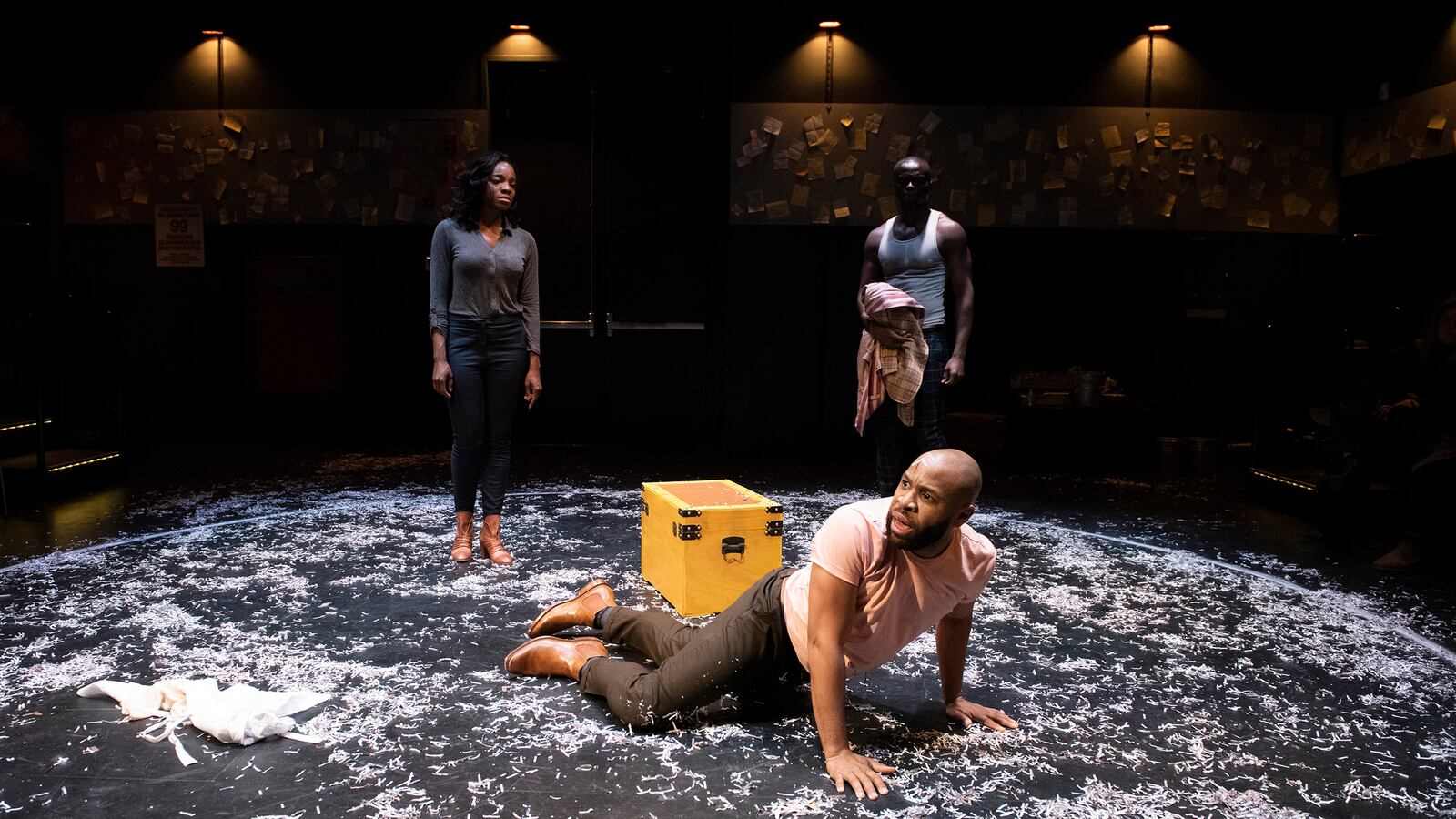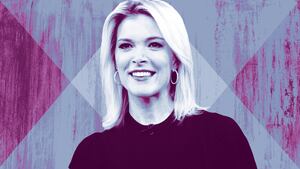The nearly 200 faces gaze back at you in everything from family photos to formal portraits to a lover’s embrace.
Some are instantly recognizable from social media hashtags and news headlines—Alton Sterling, Sandra Bland, Michael Brown, Eric Brown, Nia Wilson, Philando Castile, and countless others.
Still, there’s one stands out. On a small shelf in a frame lies a photo of Trayvon Martin, whose murder became a watershed moment, launching the Black Lives Matter movement. His death, and those that followed at the hands of racialized violence, also create part of the framing for Aleshea Harris’ What to Send Up When It Goes Down, which opened Monday night at the A.R.T./New York Theatres.
Part play, part group therapy, Obie-winner Harris’ piece immediately begins with a point of clarity. The work, directed by Whitney White, is primarily intended for a black audience, noting that it “is not often that black people have a safe, public space for expressing their unfiltered feelings about anti-blackness.”
For What to Send Up, a key to creating that safe space begins with dismantling the wall between performers and audience. As both groups gathered together in a circle, the first exercise following personal introductions was that of a ritual to honor someone recently killed.
One evening last week the ritual was for Jemel Roberson. A 26-year-old security guard, Roberson stopped an active shooter in a bar only to be killed by police responding to the scene shortly thereafter. In unison we began repeating his name, once for every year of life.
Jemel Roberson. Jemel Roberson. Jemel Roberson. Jemel Roberson. Jemel Roberson. Jemel Roberson. Jemel Roberson. Jemel Roberson. Jemel Roberson. Jemel Roberson. Jemel Roberson. Jemel Roberson. Jemel Roberson.
It’s at this halfway point that the sobering nature of the ritual kicks in. Yet, there was a weird sense of peace in saying Roberson’s name, in acknowledging that his life mattered even though it wouldn’t bring him back. As we concluded and silence filled the room, a sadness came over me as I remembered that perhaps at the very next performance and certainly within a week or two the ritual would likely be for someone new.
Pivoting from honoring a stranger, the next exercise was an inverse version of a privilege walk exploring experiences of discrimination in everything from professional upward mobility to interactions with law enforcement. The circle became not just a safe space but one in which black folks were seen and our shared personal experiences and humanity validated, offering one of the most poignant and powerful moments of the evening.
As we sat, a series of vignettes unfolded in a loop, speeding up each time. There’s the dynamic between a wealthy white woman, Miss, and her two domestic workers, Driver and Made. Driver is eager to please, perpetually shuckin’ and jivin’ telling her, “I can do anything to make ya feel good about yoself. It’d be my privilege.”
Made on the other hand, tends to household chores while seemingly plotting Miss’ murder and desires no meaningful interaction with her. Over and over Miss declares that her privilege as a white woman has had no bearing on her success and that her hands are “clean.”
The dynamic between the three is a not-so-subtle indictment of white liberals who falsely see themselves as allies because, like Miss, they “try to understand the struggle” through surface level work but still act in ways that reinforces racism. Miss declares “I see the movies. I saw the Django Unchained and The Help, The Butler, the Selma, the I Am Not Your Negro and the Black Panther to boot.”
Still, she declares to Driver, “I am a friend to your kind but that does not make me a fool,” as if there is something about the nature of black people that requires her to be cautious. The unspoken irony is that in both the vignette and everyday interactions it is often black people who find themselves on guard.
The idea of being foolish, and the real world implications for black people are a constant theme throughout the vignettes and best summed up when a man recounts a conversation with his father.
“Foolish black folks get swept off their feet in the worst way. Foolish black folks get cheated out of their own skin and bone... Black and foolish is the last thing you wanna be. You can be uppity, you can be stoic but you bet not, bet not be foolish.” In a country where Blackness is under attack to be foolish is to be naive to the reality that your skin color changes the way you are perceived and the way you walk through the world.
The strongest part of the work in this unfiltered dialogue, which also evokes internal conversations—like deciding to hold one’s tongue in the face of microaggressions in office environments and keeping a positive attitude.
“I tried. Try. Past and present. I mean, I really, really do and did. I beam, I smile, I listen. I do not take offense,” one character tells herself. To speak up is both brave and foolish because there is always a cost for doing so and she elects to say nothing to a colleague.
There is also a conversation between friends—one scared that the other’s behavior in their now gentrified neighborhood might get him killed. His offense? The way he confidently walks down the street. Because God forbid a black person should walk through their own neighborhood with the air of belonging rather than that of being the other. Still, in the context of the play and sadly in real life it’s a decision that has cost and continues to cost many their own lives.
There’s a lot to digest in the 90 minutes of What To Send Up and still more to unpack long after you leave. But that is precisely why the work excels.
What to Send Up When It Goes Down is at the Jeffrey and Paula Gural Theatre, 502 W. 53rd St., New York City, through Dec. 8.







